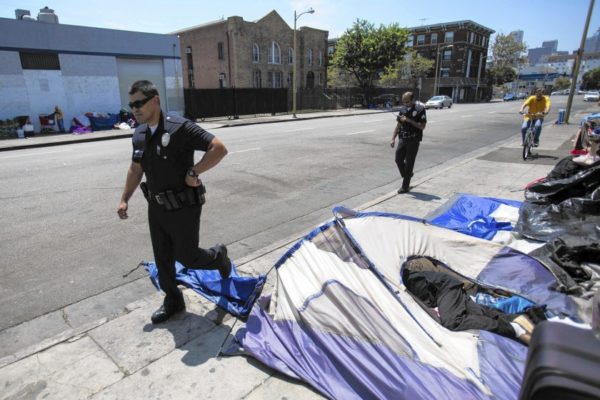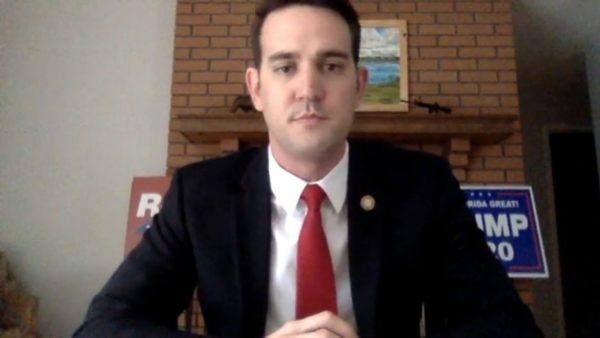Senior Trump administration officials have made quiet but significant progress toward a potential deal with Los Angeles officials that would provide federal funds and land to help shelter the city‘s and county’s growing homeless population.
The movement follows a series of phone calls involving Housing and Urban Development Secretary Ben Carson, Los Angeles Mayor Eric Garcetti and Los Angeles County Supervisor Kathryn Barger.
The positive tone, much of it behind the scenes, comes as a sharp contrast to President Trump’s bellicose anti-California rhetoric at political rallies and on Twitter. At times, the president has appeared to threaten to invoke sweeping emergency powers to force local officials to “clean up their act” rather than offer federal help.
But the political impasse appeared to break in recent days. Garcetti sent a formal letter to Carson and Trump on Thursday requesting federal help to address homelessness in Los Angeles.
“I appreciate the federal resources that Secretary Carson offered yesterday,” he wrote, referencing the city’s request for money and land. The Times obtained the letter through a public records request.
Garcetti spoke by phone with Carson on Wednesday, and the discussion included negotiations about federal funds and land, aides said. Officials would not say how much money is on the table or how close they are to an agreement.
Alex Comisar, Garcetti’s spokesman, said the mayor spoke with Carson “about the need to expand and accelerate federal investment in confronting the homelessness crisis.”
“Los Angeles is already taking bold steps forward, and more emergency assistance from our federal partners could help us scale up our work, and get our homeless neighbors off the street more quickly,” Comisar said in a statement.
Barger’s office confirmed a separate phone call with Carson as well as the ongoing talks.
“We’re asking for anything that can help us solve this homelessness problem,” said Barger’s spokesman, Tony Bell. “Mental health treatment has to be a top ingredient in the mix, in addition to other supportive services, including job training and veteran outreach.”
Carson confirmed the negotiations in a tweet Wednesday, saying he looks “forward to a new partnership” with Garcetti and Barger “that will benefit our fellow citizens.”
“We must alleviate the suffering of our most vulnerable Californians in the most compassionate way possible,” Carson added.
Carson and other Trump administration officials have promised federal action for months, but feuded with California state and local officials who have accused the president of demagoguing the city’s homelessness crisis to fire up his political supporters.
In recent weeks, administration officials have conceded that they could do little without local cooperation.
The Trump administration in the past had floated plans that would involve more aggressive crackdowns on homeless people, mostly through sweeps of skid row encampments that have been ruled unconstitutional by the courts.
In a recent Fox News interview, Carson suggested harsh measures might be needed, saying officials needed to “uncuff law enforcement so that people can be removed now and placed in transitional places.”
Garcetti officials have opposed those notions, accusing the Trump administration of “playing politics” without offering serious solutions.
But on Monday, Trump appeared to offer a cease-fire of sorts, tweeting an invitation — laced with partisan attack — for cities and states to ask for federal help to ease homelessness.
If “the city or state in question is willing to acknowledge responsibility, and politely asks for help from the Federal Government, we will very seriously consider getting involved in order to make those poorly run Democrat Cities Great Again!”
Garcetti’s office said he plans to meet with Carson when the mayor visits Washington for the annual U.S. Conference of Mayors Winter Meeting, scheduled Jan. 22-24.
Earlier this week, Gov. Gavin Newsom said he would ask state lawmakers to allocate more than $1.4 billion to help alleviate the homelessness crisis. The state’s role in the negotiations between local and federal officials was not clear.
In September, Carson and other Trump administration officials visited Los Angeles to tour shelters and streets clogged with encampments. Carson didn’t meet with Garcetti, but officials from the White House, the Justice Department and other agencies met with the mayor’s staff, toured Jordan Downs public housing in Watts and skid row.
Justice Department officials also met with the heads of the unions that represent rank-and-file Los Angeles police officers and county sheriff’s deputies to discuss options to deal with court rulings and legal settlements that have limited the LAPD’s ability to carry out sweeps at encampments.

Los Angeles police officers patrol 6th Street on skid row.
(Jabin Botsford / Los Angeles Times)
While at skid row, Carson and others met with the Rev. Andy Bales, chief executive of the Union Rescue Mission. In an interview Thursday, Bales said the news that federal and city officials were deep in talks “thrilled” him.
“It’s an answer to prayers,” he said. “I know the folks who are devastated on the streets. They’re probably praying as well. This could be an answer to all of our prayers.”
Bales said White House officials whom he declined to name had told him the Trump administration would offer federal land that could be used to build emergency shelters, along with money for medical services.
A White House spokesman declined to comment Thursday.
A deal offers potential risk and reward for both Trump and Garcetti. Trump has used the homelessness crisis to cast big cities that oppose him politically as poorly run and dangerous, stoking fears and contempt among his more rural Republican base.
California’s largely Democratic political establishment considers itself the headquarters for anti-Trump forces, which view the president’s policies as racist and discriminatory.
But Garcetti has tried to cast himself as a bridge builder who will do anything to help the city. And Trump suggested in his Monday tweet that he views a deal as an opportunity to play the role of hero in contrast to what he describes as failing Democratic leadership.
In the past, Garcetti has called Trump’s rhetoric on homelessness “political cheap shots [that] don’t solve difficult problems.” Both he and Newsom have called for more housing vouchers to be made available and called for increased investment in programs that help house poor people.
“I welcome any investment this administration wants to make in our local and what is a national problem,“ Garcetti told The Times over the summer.
Bierman reported from Washington, and Oreskes and Smith reported from Los Angeles.


